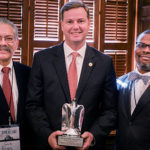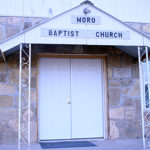Christians must be true to the gospel—and honest with each other—if they hope to secure racial justice in America, a multi-racial panel convened by the Texas Baptist Christian Life Commission insisted.
“The reason we are where we are is because the church has abdicated its responsibility,” Kathryn Freeman, the commission’s director of public policy, said introducing the discussion at Park Central Baptist Church in Dallas Sept. 26.
Race relations? It’s a long story
 Participants in a panel discussion on race were (left to right) Ryan Jespersen, urban missions director for the Baptist General Convention of Texas; Tamiko Jones, pastor of missions and young adults at Bethlehem Baptist Church in Mansfield; Anyra Cano-Valencia, youth pastor at Iglesia Bautista Victorio en Cristo in Fort Worth and a teacher at Baptist University of the Américas in San Antonio; and Christian Life Commission Chair Michael Evans, pastor of Bethlehem Baptist Church in Mansfield. (Photo/Marv Knox)“Where we are” is a long, continuing story, noted Michael Evans, pastor of Bethlehem Baptist Church in Mansfield and chairman of the commission.
Participants in a panel discussion on race were (left to right) Ryan Jespersen, urban missions director for the Baptist General Convention of Texas; Tamiko Jones, pastor of missions and young adults at Bethlehem Baptist Church in Mansfield; Anyra Cano-Valencia, youth pastor at Iglesia Bautista Victorio en Cristo in Fort Worth and a teacher at Baptist University of the Américas in San Antonio; and Christian Life Commission Chair Michael Evans, pastor of Bethlehem Baptist Church in Mansfield. (Photo/Marv Knox)“Where we are” is a long, continuing story, noted Michael Evans, pastor of Bethlehem Baptist Church in Mansfield and chairman of the commission.
American slavery began in 1619 and only officially ended at the conclusion of the Civil War in 1865, he noted. But Jim Crow laws that oppressed people of color persisted in some places until the mid-1970s.
Across the generations, some Christians have drawn “theological misconceptions” from Scriptures they claim condone slavery, he added. And this year, African-Americans are two and a half times as likely as white people to be shot and killed by police, and unarmed blacks are five times as likely as unarmed whites to be shot and killed by police.
Racial equality in Texas includes Hispanics
In Texas, the conversation about racial inequality “is broader than just African-Americans; it includes Hispanics” who also have been subjected to racial discrimination Freeman added.
“My family is of Mexican descent. My family has worked very hard in this country to get me to where I am today,” said Anyra Cano-Valencia, youth pastor at Iglesia Bautista Victorio en Cristo in Fort Worth and a teacher at Baptist University of the Américas in San Antonio.
Sign up for our weekly edition and get all our headlines in your inbox on Thursdays
“I have family in Mexico who are not criminals, rapists or drug dealers,” she said, echoing U.S. presidential candidate Donald Trump. “I have a husband who is Columbian who is not a criminal, rapist or drug dealer.”
‘Racism is alive and well’ — even in churches
“No matter how dressed up, educated and neat I may appear, I do experience folks following me around a store,” reported Tamiko Jones, an African-American and pastor of missions and young adults at Bethlehem Baptist Church in Mansfield. “Racism is alive and well.”
Unfortunately, it persists in Texas Baptist churches, acknowledged Ryan Jespersen, urban missions director for the Baptist General Convention of Texas.
Jespersen consults with Texas Baptist congregations, trying to help them reach their neighbors. He recounted a visit with church leaders who said they didn’t like Hispanic people and later asked why their church doesn’t grow.
“I said, ‘Because you hate your community,’” he noted. “I genuinely do see racism many times in our churches. A lot of times, it’s unspoken—but sometimes not unspoken.”
Fortunately, that’s not the sum total of churches’ response, Jespersen added: “I do see many Texas Baptist churches embracing the entirety of their communities—and making specific efforts to include people of various races. If churches will make an effort (at inclusion), it certainly can be done.”
View on race affect spiritual growth
Race and racism affect people’s spiritual lives, the panelist said.
Evans recounted how his image of Jesus has changed through the phases of his life. As an African-American boy, with family faithful in Catholic, Methodist and Baptist churches, “I had the image of a white Jesus with blue eyes and blond hair,” he said.
As a seminary student who learned about the early church fathers of northern Africa, “Jesus was black to me then,” he added. “But I grew from the need to have a black Jesus to have a more intimate relationship with Christ. My Christ no longer took on the image of a man but became a mighty spiritual force that gave me courage to do what I had to do.”
Cano-Valencia recalled her parents cautioning her, “Don’t rock the boat” and hearing the admonition that people should be color blind.
“Color blind says, ‘I don’t see the you who God created you to be,” she stressed. “Instead of being color blind, why don’t we embrace the richness, the diversity that God created?”
Jones described blessing borne through suffering. “Any time you go through trials and tribulations, that brings you closer to the cross,” she said. “I’m thankful for my faith, because it confirms who I am. I am thankful to be who I am right now.”
Start the conversation at church
The panelists insisted church is the place to discuss race.
Bethlehem Baptist in Mansfield is working with a predominantly white Methodist congregation in its community, beginning with conversations between the staffs and hoping to build to conversations on race relations between many members of both churches, Evans said.
Talking in church with law-enforcement officers and discussing “police shootings and the realities behind them” is vital, he said, adding, “If (Christians) do not settle the matter of serving Christ together, we’re going to spend so much time figuring each other out, the Muslims will bypass us. We’re treading water while other religious groups are growing, and we’re in a nonreligious, atheistic culture.”
“When terrible things happen to black people and Hispanics because of race, we talk about it at church,” Cano-Valencia said. “We talk about ‘What is God’s desire?’ and ‘What is God’s justice?’ … I have had to learn how to forgive and to love. I’m also sinful, and I’ve also had prejudices, and I need to forgive my brother and sister in Christ, to love them, to forgive them and to model what racial reconciliation looks like.”
Be transparent, even when it’s uncomfortable
Dialogue between races is important, but it needs to move out, even to include conversation about race among the BGCT Executive Board members, Evans urged.
“We must face the reality: We all have a stain on us. It’s there; it’s deep. But it fades through dialogue. … We do not need to be afraid to ask questions, to be completely transparent.”
“It won’t be convenient. It won’t be comfortable. It will cost us something, but we have been called to action,” Jones said. “We have to get an understanding as to why anger exists, why people act as they do.”
“As a church, foster racial reconciliation and justice,” Jespersen added. “Invite people who are ethnically different from you into real leadership in your church. Become more multi-racial, more multi-cultural in your approach.”
“Fall in love with who God created—people,” Cano-Valencia challenged.














We seek to connect God’s story and God’s people around the world. To learn more about God’s story, click here.
Send comments and feedback to Eric Black, our editor. For comments to be published, please specify “letter to the editor.” Maximum length for publication is 300 words.